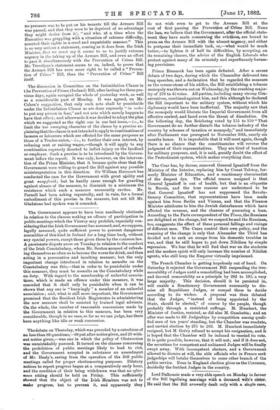The discussion in Committee on the Intimidation Clause in the
Prevention of Crime (Ireland) Bill, after lasting for three pre- vious days, again occupied the whole of yesterday week, as well as a considerable part of Monday. It was agreed, on Mr. Cohen's suggestion, that only such acts shall be punishable under the Intimidation Clause as are done expressly " in order to put any person in fear," and not acts which merely happen to have that effect; and afterwards it was decided to adopt the plan which we suggested as the right one in our last issue,—i.e., to limit the too sweeping character of the clause by a proviso ex- plaining that the clause is not intended to apply to combinations of farmers or labourers which are effected for the same purposes as those of a Trades-union,—i.e., to further their own interest, by reducing rent or raising wages,—though it will apply to any combination expressly directed to inflict injury on the landlord or employer. Such a proviso is to be introduced by the Govern- ment before the report. It was only, however, on the interven- tion of the Prime Minister, that it became quite clear that the Government were willing to guard the Bill against any possible misinterpretation in this direction. Sir William Harcourt has conducted the case for the Government with great ability and great sangfroid; but he hardly cares enough for guarding against abuses of the measure, to diminish to a minimum the resistance which such a measure necessarily excites. Mr. Parnell had been asking repeatedly, and in vain, for a formal embodiment of this proviso in the measure, but not till Mr. Gladstone had spoken was it conceded.


































 Previous page
Previous page